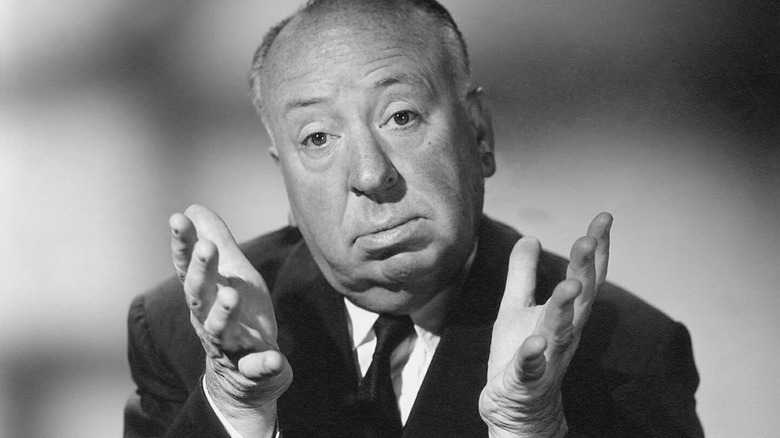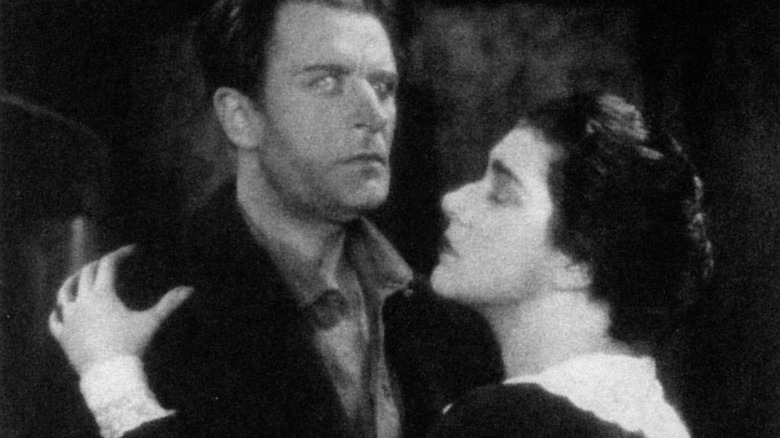Alfred Hitchcock's Most Intriguing Movie Is Impossible To Watch Today
Alfred Hitchcock's astounding legacy as a filmmaker spans more than six decades, starting with "The Lodger," a 1927 silent film that is believed to be the director's first critical success. The overarching themes in "The Lodger" anticipate Hitchcock's directorial sensibilities, such as his keen interest in complex psychosexuality and a perceptive preoccupation with death, guilt, and the cyclical nature of trauma. If we were to go further back, there's the debut feature "The Pleasure Garden," which was deemed too erotically charged back when it was released, and contains the blueprints for the iconic imagery that would end up defining his oeuvre down the line.
However, a lesser-known film exists right between "The Pleasure Garden" and "The Lodger" — one that has been deemed lost media save for the existence of six surviving stills from it. This 1926 silent film, "The Mountain Eagle," is a romantic drama that leans heavily into German expressionism, while taking a more sensational route to establish the story. Per "The Guardian," Hitchcock described this film as "awful," and allegedly expressed relief about its lost status after every surviving print was lost/destroyed during his lifetime. It's tough to truly gauge this sentiment as the film can never be evaluated on its own merits, but it is an interesting perspective from a filmmaker who is known for being fearless and unapologetic about his craft.
This is a good chance to delve into the history of "The Mountain Eagle," which the British Film Institute (BFI) believes to be the only missing Hitchcock (that we know of). Technically, we do have another "lost" Hitchcock title (1922's "Number 13"), but its unfinished status typically classifies it as missing as opposed to lost, even though it is highly sought after. If we are being thorough here, then his 1930 short film, "The Elastic Affair" (which he made for an awards ceremony at the London Palladium), can also be considered lost to time.
Hitchcock's The Mountain Eagle is one of the most sought-after lost films
Hitchcock's silent era films are crucial to better understand his evolution as a storyteller, especially as someone who could weave symbolically rich imagery and convey thematic depth through it. Arike Oke, the Executive Director of Knowledge at BFI, spoke to Variety about the earliest echoes that would become more prominent throughout Hitchcock's career:
"There are things in those films [the earlier, silent era ones] that you can see echoes of in his later work, where he becomes a known filmmaker. You also see him start to experiment with shot styles and storytelling, with some of the mystery and murder kind of elements and the melodrama."
The mystique surrounding "The Mountain Eagle" might've contributed to the fact that it is so desperately sought after. Any existing perceptions of the silent film are based on a set of production stills that have (fortunately) managed to survive. The film seems to be set in Kentucky, where a woman dies after a difficult childbirth, and her husband (Bernhard Goetzke) tends to his surviving newborn, Edward (John F. Hamilton). Once Edward reaches adolescence and starts exploring his sexuality, he becomes tangled in an inappropriate relationship with his schoolteacher, Beatrice (Nita Naldi). One would think that this would draw his father's ire, as every parent would want to protect their son, but Hitchcock injects psychosexual jealousy into this drama and molds it into a tale of wrath and revenge.
Information about the film's ending remains contradictory as no one can verify its true nature, but the BFI still hopes that "The Mountain Eagle" has managed to survive somewhere, somehow. Is it collecting dust in somebody's forgotten collection of 1920s-era silent films? Perhaps not, but film preservation experts and filmmaking enthusiasts are actively hoping that it might have been catalogued somewhere under a different name and will inevitably resurface soon.

